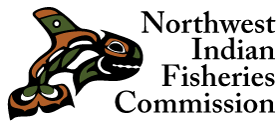Squaxin Island Tribe recreating Oakland Bay to investigate bacteria
Categories: News

John Konovsky (left), environmental program manager for the Squaxin Island Tribe, and Joe Puhn, water quality technician, set slides to collect bacteria tainted sedmient in Oakland Bay.
The tribe is trying to learn more about harmful bacteria from failing septic systems and livestock manure that may become trapped on top of tideland sediments in upper Oakland Bay. “We think that instead of dying off like they usually do, the bacteria are surviving and amplifying the pollution, particularly during the summer months,” said John Konovsky, environmental program manager for the Squaxin Island Tribe.
“In a lab, we can recreate similar environmental conditions and track what the bacteria are doing more precisely,” he said.
Fecal coliform bacteria come from human and animal waste, and can’t usually survive long in saltwater. But if the bacteria become trapped on nutrient-rich sediment particles, they may undergo a physiological reaction that enables their survival, Konovsky said.
Tribal researchers are collecting polluted sediment from the bay for use in two 40 gallon aquariums. Twenty-four cups filled with sediment from the tidelands will be subject to conditions similar to the bay. Twice a day, water levels in the aquariums will rise and fall like the tides in Oakland Bay. The “tide” will gradually expose one set of cups, then the other.
“By recreating every aspect of the bay that would impact the bacteria, down to the temperature, sunlight and water quality, we hope we can get a better idea of how well these bacteria survive,” Konovsky said. “You can only get this close a look in a laboratory, you’d never be able to track detail like this in the field.”
In recent years, pollution has peaked in Oakland Bay during the summer, which is contrary to its normal cycle. “Usually, in marine areas like Oakland Bay, pollution peaks in the winter when rain washes it into the bay,” Konovsky said. “This summer peak indicates something different is going on here.”
The uppermost portion of Oakland Bay remains restricted for shellfish harvest in the summer. “We need to reverse the trend now,” said Andy Whitener, natural resources director for the tribe. “More harvest closures in Oakland Bay would be disastrous for tribal harvesters and would devastate the shellfish industry, a vital part of the local economy.”
“Tribal members always have depended on shellfish as a source of nutrition, for income and as a way of life,” Whitener said. “Our treaty right to harvest shellfish depends on healthy shellfish, so we need to track down and solve this pollution problem.”
(END)
For more information, contact: John Konovsky, environmental program manager, Squaxin Island Tribe, (360) 432-3804. Emmett O’Connell, South Sound information officer, NWIFC, (360) 528-4304,

Comments are closed.